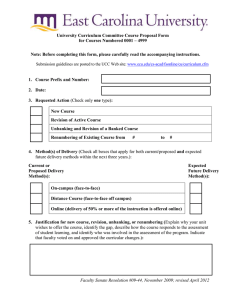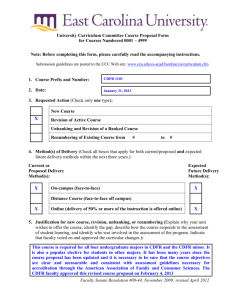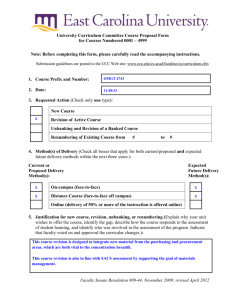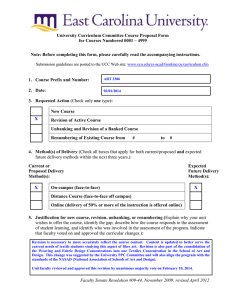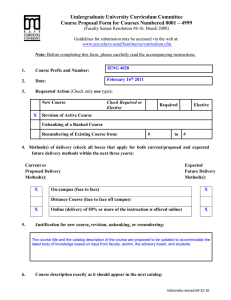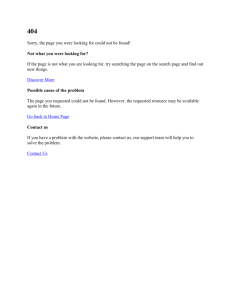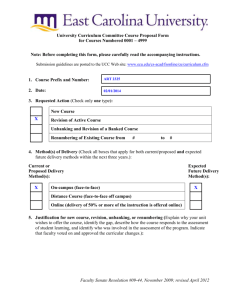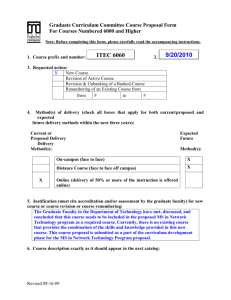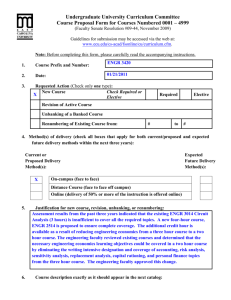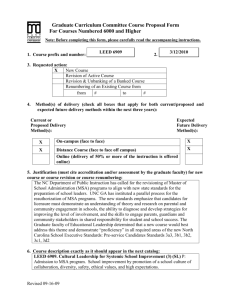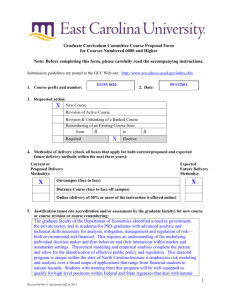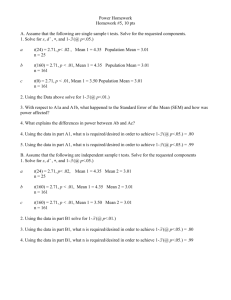OVERVIEW OF UNDERGRADUATE CURRICULUM DEVELOPMENT
advertisement
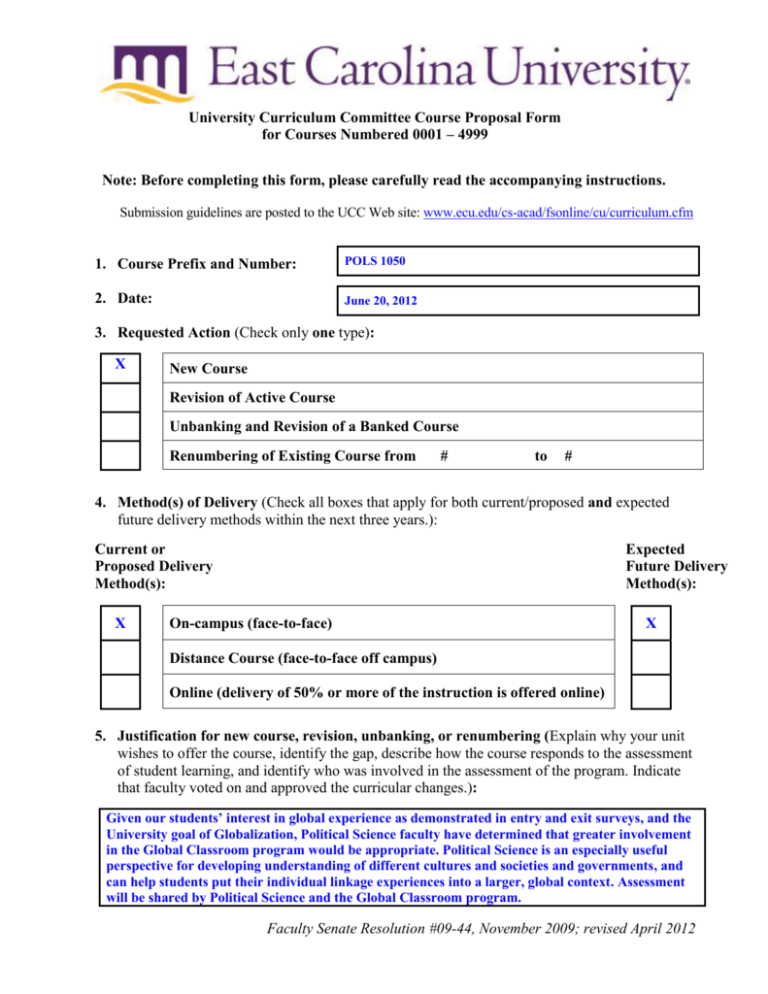
University Curriculum Committee Course Proposal Form for Courses Numbered 0001 – 4999 Note: Before completing this form, please carefully read the accompanying instructions. Submission guidelines are posted to the UCC Web site: www.ecu.edu/cs-acad/fsonline/cu/curriculum.cfm 1. Course Prefix and Number: POLS 1050 2. Date: June 20, 2012 3. Requested Action (Check only one type): X New Course Revision of Active Course Unbanking and Revision of a Banked Course Renumbering of Existing Course from # to # 4. Method(s) of Delivery (Check all boxes that apply for both current/proposed and expected future delivery methods within the next three years.): Current or Proposed Delivery Method(s): X Expected Future Delivery Method(s): On-campus (face-to-face) X Distance Course (face-to-face off campus) Online (delivery of 50% or more of the instruction is offered online) 5. Justification for new course, revision, unbanking, or renumbering (Explain why your unit wishes to offer the course, identify the gap, describe how the course responds to the assessment of student learning, and identify who was involved in the assessment of the program. Indicate that faculty voted on and approved the curricular changes.): Given our students’ interest in global experience as demonstrated in entry and exit surveys, and the University goal of Globalization, Political Science faculty have determined that greater involvement in the Global Classroom program would be appropriate. Political Science is an especially useful perspective for developing understanding of different cultures and societies and governments, and can help students put their individual linkage experiences into a larger, global context. Assessment will be shared by Political Science and the Global Classroom program. Faculty Senate Resolution #09-44, November 2009; revised April 2012 6. Course description exactly as it should appear in the next catalog: POLS 1050. Politics and Global Understanding (3) (FC:SO) Virtual exchange with a variety of countries to explore the interrelationship between political culture and perspectives, institutions of government, political processes, and policy outcomes. 7. If this is a course revision, briefly describe the requested change: NA 8. Identify if the new/revised course will be a required and/or elective course in one of the degrees/minors/certificates offered by your unit. Is this course required (yes/no)? NO Is this course an elective (yes/no)? YES 9. If writing intensive (WI) credit is requested, the Writing Across the Curriculum (WAC) Committee must approve WI credit prior to consideration by the UCC. Has this course been approved for WI credit (yes/no/NA)? NA If Yes, will all sections be WI (yes/no/NA)? NA 10. If service-learning (SL) credit is requested, the University Service-Learning Committee (USLC) must approve SL credit prior to consideration by the UCC. Has this course been approved for SL credit (yes/no/NA)? NA If Yes, will all sections be SL (yes/no/NA)? NA 11. If foundations curriculum (FC) credit is requested, the Foundations Curriculum and Instructional Effectiveness (FCIE) Committee must approve FC credit prior to consideration by the UCC. If FC credit has been approved by the FCIE committee, then check the appropriate box (check at most one): English (EN) Humanities (HU) Science (SC) X Social Science (SO) Fine Arts (FA) Mathematics (MA) Health (HL) Exercise (EX) Faculty Senate Resolution #09-44, November 2009; revised April 2012 12. Approval by the Council for Teacher Education (required for courses affecting teacher education programs): X Not Applicable Applicable (CTE has given their approval) 13. Course Credit: Per Week or Per Term = Credit Hours Lab Per Week or Per Term = Credit Hours s.h. Studio Per Week or Per Term = Credit Hours s.h. Practicum Per Week or Per Term = Credit Hours s.h. Internship Per Week or Per Term = Credit Hours s.h. Lecture Hours 3 3 s.h. Other (e.g., independent study): s.h. Total Credit Hours 14. Anticipated yearly student enrollment: 3 s.h. 30 15. Affected Degrees or Academic Programs: Degree(s)/Course(s) Change in Degree Hours NA 16. Overlapping or Duplication with Affected Units or Programs: X Not Applicable Applicable (Notification and/or Response from Units Attached) 17. Instructional Format(s): X Lecture X Technology-mediated Lab Seminar Studio Clinical Practicum Colloquium Internship Other (describe below): periodic linkage with classes in other countries X Student Teaching Faculty Senate Resolution #09-44, November 2009; revised April 2012 18. Statements of Support: Please attach a memorandum, signed by the unit administrator, which addresses the budgetary and personnel impact of this proposal. X Current personnel is adequate Additional personnel are needed (describe needs below): X Current facilities are adequate Additional facilities are needed (describe needs below): X Initial library resources are adequate Initial resources are needed (give a brief explanation and estimate for cost of acquisition of required resources below): X Unit computer resources are adequate Additional unit computer resources are needed (give a brief explanation and an estimate for the cost of acquisition below): X ITCS Resources are not needed The following ITCS resources are needed (put a check beside each need): Mainframe computer system Statistical services Network connections Computer lab for students Describe any computer or networking requirements of this program that are not currently fully supported for existing programs (Includes use of classroom, laboratory, or other facilities that are not currently used in the capacity being requested). Approval from the Director of ITCS attached Faculty Senate Resolution #09-44, November 2009; revised April 2012 19. Course Syllabus Information: a. Textbook(s) and/or readings: REQUIRED: Juliet Kaarbo and James Lee Ray 2011. Global Politics, NY: Houghton Mifflin, 11th ed. ISBN-10: 0495802646 REQUIRED: CultureGrams individual country reports. downloadable PDFs for relevant countries, as well as the pdf of USA for the International Visitor. ($4.00 each) VARY ACCORDING TO LINKAGES BY SEMESTER; http://culturegram.stores.yahoo.net/incul.html b. Course objectives for the course (student – centered, behavioral focus) Upon completion of this course, students will be able to: participate in a virtual collaborative learning environment with students and faculty from other countries. analyze the underlying nature of international relations and globalization from a political science perspective Describe & Explain the processes of international relations & globalization as they relate to the partner countries Describe and Explain the conceptual framework, and the ways it may be used to effectively interact with, understand and learn from peoples of other cultures. Discuss the obstacles and normative issues related to cross-cultural interactions. Foster international partnerships via technology to develop trust, friendship and future opportunities for scholarly collaboration. c. Course topic outline Part I. Course Overview; Theory & History Lectures: Theories of global politics; the historical setting; the modern Era Partner Country Intro Linking Day Part II. States and Foreign Policy Lectures: the Power of States; Making Foreign Policy Linking Days ; Country debrief Part III. Security Relations Lectures: International conflict; Ethnic Conflict and Terrorism; Avoiding Conflict: Bargaining; IO's, laws and ethics Partner Country Intro Linking Days; Country Debrief Part IV: Economic Relations Lecture: Interdependence among rich states; Developing states; Regional integration Partner Country Intro Part V: Global Challenges Linking days Lectures: The future; Summary; Surveys Faculty Senate Resolution #09-44, November 2009; revised April 2012 d. List of course assignments, weighting of each assignment, and the grading/evaluation system for determining the course grade. Grading: Midterm exam Journal Project Participation Final Exam 20% 20% 20% 20% 20% A = 93-100 A- = 90-92 B+= 88-89 B = 83-87 B- = 80-82 C+ = 78-79 C = 73-77 C- = 70-72 D+ = 68-69 D = 63-67 D- = 60-62 F = 0-59 NOTE: Beginning in fall of 2012, grading scales should reflect the implementation of the “+/-” grading scale adopted by the faculty. Faculty Senate Resolution #09-44, November 2009; revised April 2012
